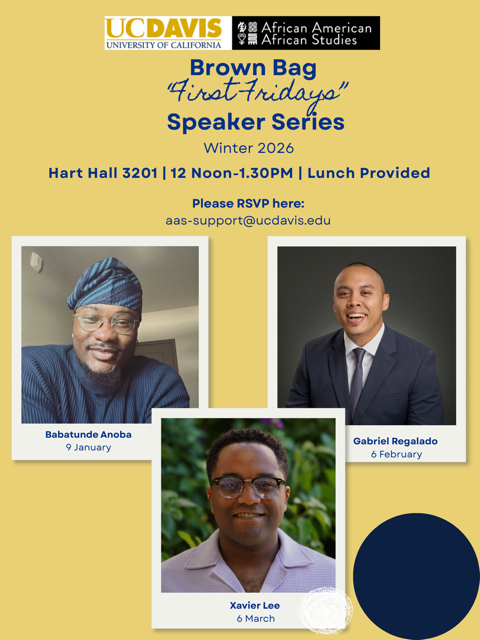Our first talk for the Winter Quarter features, ibrahim Babatunde Anoba, PhD History Candidate with a D.E. in African diaspora studies. Please join us for a great presentation, conversation, and food! *Lunch is provided.
12:00pm-1:30pm
Hart Hall 3201
Title: Pursuing African Science and Re-Inventing Òrìṣà Religion in Late Colonial Nigeria
Abstract: Starting in the 1890s, British colonial administrators in what is present-day Western Nigeria introduced a series of ordinances to control aspects of Òrìṣà Religion. These legal regimes equated the core principles of Òrìṣà Religion with "witchcraft," which is a criminal designation. The attempt to control ushered in a period of persecution targeting devotees of that religion. However, from the 1940s, devotees identified and exploited loopholes in the system that facilitated their oppression. They explored different methods of performing colonial modernity and claiming space. In this process, Òrìṣà Religion became articulated as science. This presentation is about the politics of fitting an African idea of the "scientific" within the hegemonic limitations of colonial science. It is an alternative history of African nationalism defined by propaganda, fear of the maleficence, and the rise of an African intellectual tradition rooted in Òrìṣà phenomenology.
Bio: ibrahim Bàbátúndé Anọ́ba is a PhD candidate in African history and African diaspora studies. His dissertation explores how Òrìṣà Religion evolved in response to colonial jurisprudence, African nationalism, and post-colonial state-making processes. Anọ́ba's research has received support from The Huntington, the Bancroft Library, the Hoover Institution, the New York Public Library, the Melville J. Herskovits Library of African Studies, the American Society for Legal History, and several others. His work had appeared in History in Africa, Journal of Religion in Africa, and Journal of Church and State.
Our second talk for the Winter Quarter features, Gabriel Regalado, the UC Chancellor’s Postdoctoral Fellow in the Department of African American and African Studies. Please join us for a great presentation, conversation, and food! *Lunch is provided.
Friday, February 6th, 2026
12:00pm-1:30pm
Hart Hall 3201
Title: The Futures of Black Internationalism and Global South Solidarity
Abstract: This project examines the international dimensions of Black radicalism and the prospects and complications of multilateral solidarity in the 21st century. 2025 has seen the acceleration of draconian immigration policies and the reinforced legitimacy and expansion of police and prison institutions in the U.S. These developments have demonstrated how the carceral state and western imperialism operate as collaborative forces. The fates of racialized communities in the U.S. and oppressed communities throughout the Global South are therefore deeply interconnected. This project engages participant-observer methods that involve delegations of Los Angeles youth activists in immersive traveling experiences to critical locations of Black radical developments. These delegations endeavored to connect and build community with local activists, artists, and farmers and to engage the Black radical tradition as a precondition for effective and meaningful solidarity in advancing movements for sovereignty, self-determination, reparations, and economic justice. These locations include Cuba, Puerto Rico, and South Africa.
Bio: Gabriel is the UC Chancellor’s Postdoctoral Fellow in the Department of African American and African Studies at UC Davis. He earned his Ph.D. in African Diaspora Studies and Critical Theory at UC Berkeley. His concentrations of study include Pan Africanism, the Black Radical Tradition, Black nationalism, Marxist theory, carceral studies, Caribbean politics, and Austronesian history and futurity. As a community organizer with the Social Justice Learning Institute, Gabriel has designed and implemented youth leadership programs focused on international research and disrupting the school-to-prison pipeline. As the senior manager of the Bold Vision initiative, he oversaw the development of its policy platforms aimed at creating thriving futures for LA County youth. His future project will explore Black radical epistemologies and political ecologies of Oceania and Southeast Asia, interrogating the complexities of Black Asiatic and Pasifika identities.
Our third talk for the Winter Quarter features, Xavier Lee, an assistant professor of English at UC Davis. Please join us for a great presentation, conversation, and food! *Lunch is provided.
Friday, March 6th, 2026
12:00pm-1:30pm
Hart Hall 3201
Title: On Accommodation: Saidiya Hartman's Lose Your Mother
Abstract: Saidiya Hartman begins her landmark account of Ghana's heritage tourism route with a stirring description of her alienation, predicated on the Twi epithet obruni / oborɔnyi. By establishing from the outset Hartman's extraneity from both Ghana as host country and Africa as motherland, the critic sets up the essential stakes for the narrative portion of Lose Your Mother. (2008) At several key points in the text, Hartman makes affective demands of the Ghanaian and African locals she comes across that either go unanswered or are forcefully rejected. Thus there is an essential tension between the reconciliatory desires of diaspora tourists engaging in Ghana's booming heritage tourism industry and the local right to accommodate persons considered to be cultural outsiders, foreigners and visitors. This short essay studies the literary dynamics of Lose Your Mother, with special attention to Hartman's descriptions of alienation and rejection from the Ghanaian locals. I use these descriptions to theorize the problem of accommodation as an essential part of the tourism industry in general and as an under-theorized aspect of the intramural account of heritage tourisms and returnees in West Africa in particular. The essay studies how accommodation participates in the affective economy of tourism as a perceived right towards hospitality.
Bio: Xavier Lee is an assistant professor of English at the University of California, Davis, where he teaches courses in literary studies, film studies, critical theory and historiography. His research focuses on historical literature of the African Atlantic world, with an emphasis on Anglophone and Francophone novels set during the time of slavery.

